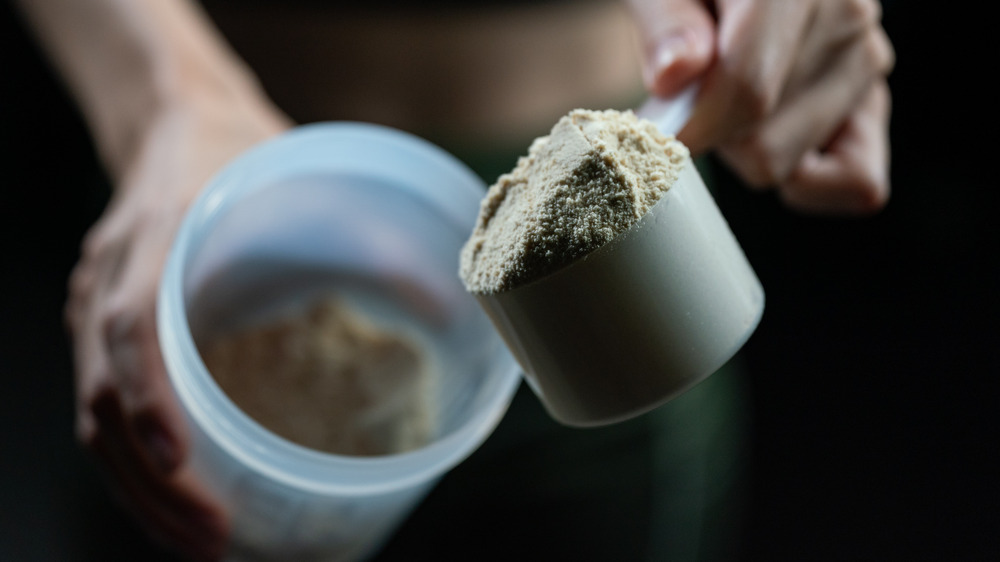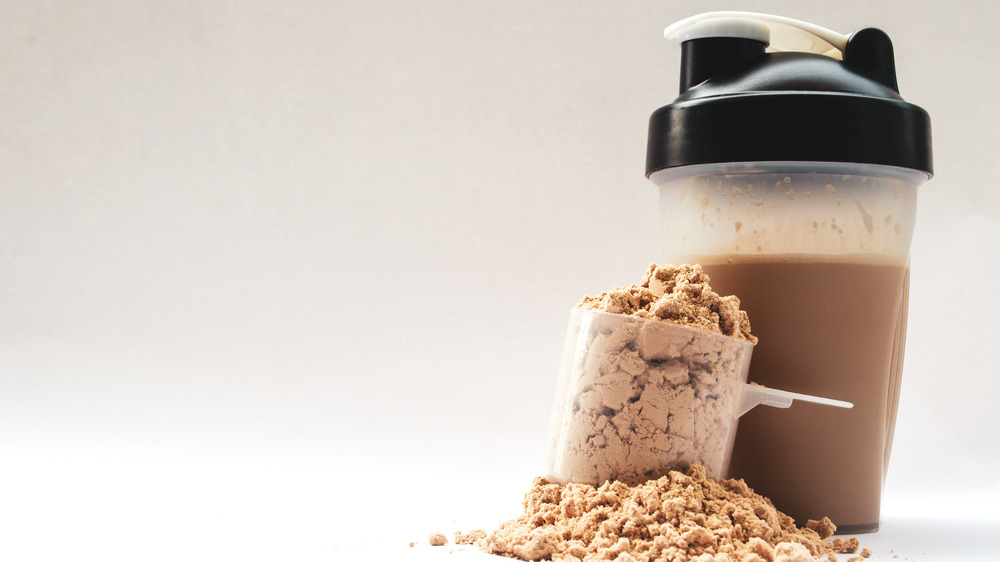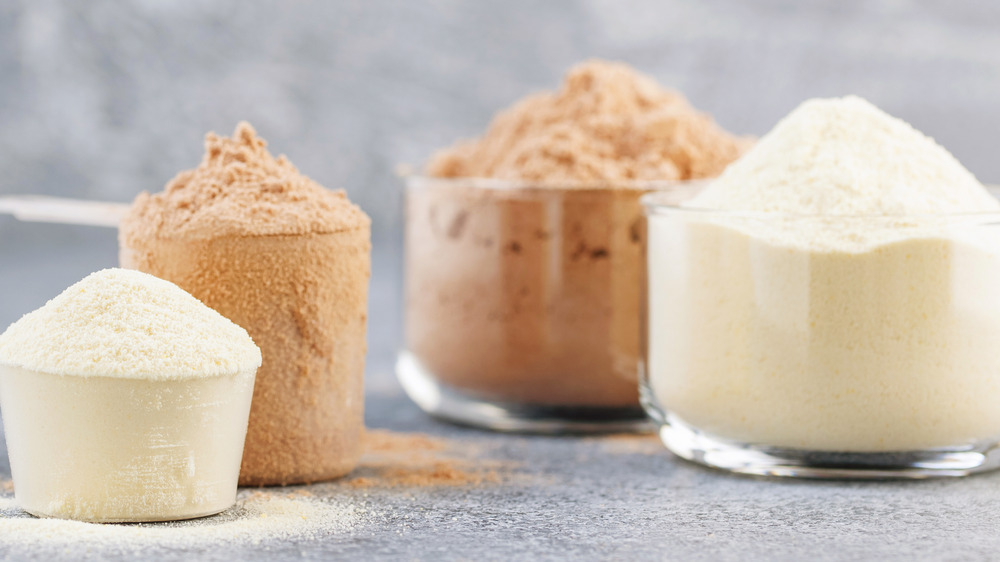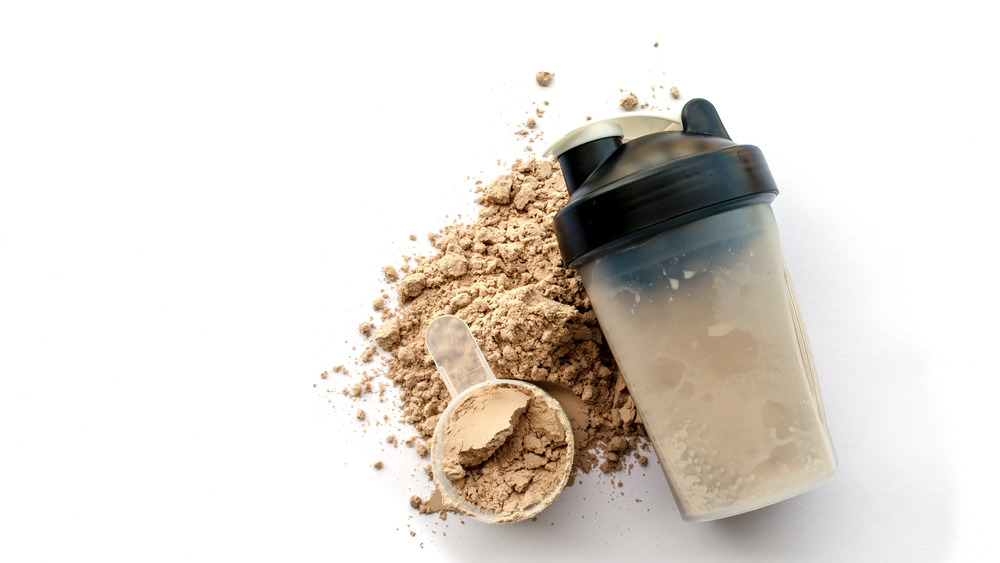Whey Protein Vs. Pea Protein: Which Is More Nutritious?
Protein powders are among the most commonly-used workout supplements by both exercisers looking to pack on muscle mass and those with goals of lowering their body weight — and for good reason. Whether they contain proteins that have been isolated from cow's milk or from yellow split peas, most protein powders found in the supplement aisle contain all 9 essential amino acids not naturally made by the body, as well as offer a generous helping of protein at over 20 grams per serving regardless of what they're made from (via Healthline).
The combination of essential amino acids and proteins is crucial when it comes to aiding the body in muscle growth, tissue repair, and performing other bodily functions (via Medline Plus). However, with an increasing variety of protein powders becoming available to consumers, such as whey-based and pea-derived proteins, it's easy to wonder which of the two offers the most nutrition and overall dietary benefit.
What makes them different?
In order to break down the nutritional values of both whey and pea protein, it is first important to consider where they come from. Whey protein is isolated from whey: the water-soluble component in milk that is extracted from the curds (or casein) when a coagulant is added to cow's milk, according to Examine. By itself, whey contains all 9 essential amino acids the body needs for muscle-building, making the animal-based protein powder a complete protein every time (via Healthline). Pea protein, however, derived from yellow split peas, can not always be relied on as a complete protein source due to low levels of certain amino acids.
Pea protein is jam-packed with an amino acid called arginine, which — although there isn't conclusive research — could be beneficial in lowering blood pressure (via Women's Health). Pea protein is rich in both iron and fiber, and devoid of lactose, which makes it a safer option for those who are allergic or live a dairy-free lifestyle. Plus, it's gluten-free whereas as whey protein may contain added gluten. While it is similar to whey protein in both calories and amount of protein per scoop, because pea protein is a complete protein, it lacks some of the essential amino acids your body needs but can't naturally produce. Balancing your diet with additional healthy proteins and whole grains, however, will compensate for what is missing in the plant-based powder.
Which protein provides the most nutrition?
Both whey and pea protein come with their share of benefits and disadvantages. Beyond its highly sought-after benefit of aiding muscle growth and recovery, whey protein can be a robust supplement in diets that are geared towards weight gain and maintenance, especially for folks who are older or who have been diagnosed with conditions that cause weight loss, such as HIV/AIDS (via Mayo Clinic). Whey protein has also been found to benefit the skin, both as a way to heal burns or chronic wounds and to prevent eczema in infants when given in the form of a hydrolyzed formula. However, the animal-based protein has been found to cause gastrointestinal upset. According to Examine, Whey protein can worsen pre-existing liver or kidney damage, but it is not likely to cause any initial damage.
While one might expect that whey protein would be more effective in muscle-building than pea protein because the former is a complete protein and the latter is not, some studies have shown that pea protein is comparable to whey in its effectiveness at building and repairing muscle tissue after workouts that are high in intensity and resistance, according to Healthline. Due to its high fiber content, the plant-based protein can also suppress appetite, which can aid in weight-loss. Your body might respond negatively to pea protein powder, however, if you are allergic to peanuts or other legumes (via Women's Health).
Are they safe to consume?
Because protein powder is considered a dietary supplement by the FDA, there is not much regulation on how manufacturers label them, which can lead to false advertisements or omissions (via Harvard Health Letter). Additionally, the Clean Label Project found that a significant number of protein powders contain pesticides and heavy metals such as lead, arsenic, and mercury. BPA (an ingredient used to make plastic) was also found in some protein powders – one of them had 25 times the required limit of the substance. Because of this, doctors like Kathy McManus (director of the Department of Nutrition at a Harvard-affiliated hospital) advise consumers to only use protein powders if they are struggling with low appetite or recovering from a wound, as protein helps repair damaged cells and regenerate new ones.
To limit the amount of protein powder you consume, try raising your intake of whole foods such as nuts, seeds, legumes, and low-fat dairy products. For a non-processed plant-based protein source, Women's Health suggests eating peas (fresh or frozen) as-is to receive not only the plant-based nutrients but also a giant serving of fiber and additional nutrients that are typically removed from the peas when they are being processed into protein powder.
If you're looking for something animal-based, products such as eggs, fish, poultry, and lean meat can be good natural sources of protein that will supplement your daily protein intake without needing additional help from a powder.



